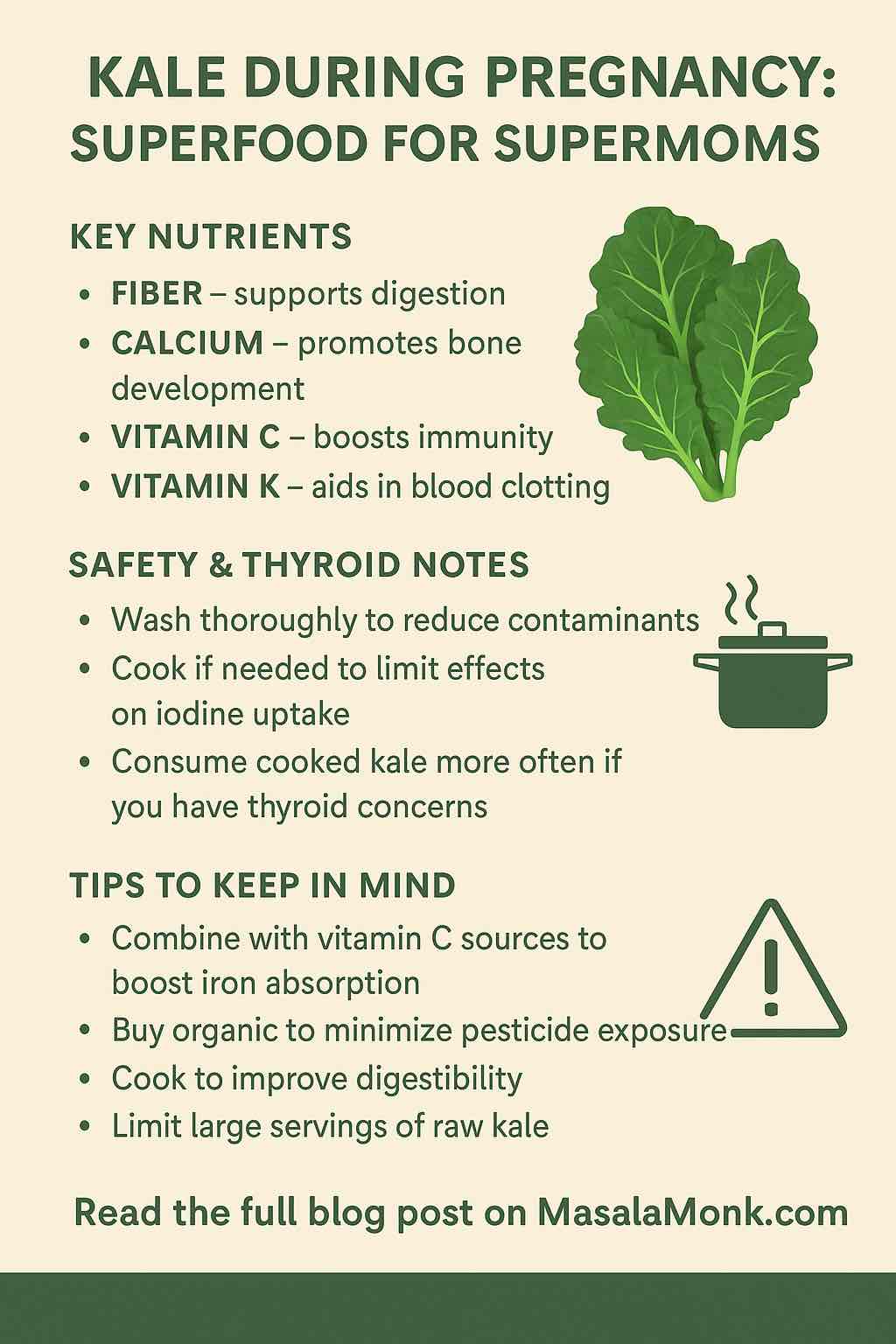
Pregnancy has a way of changing how you look at food. Suddenly, it’s not just about taste—it’s about nourishment, safety, and supporting the tiny human growing inside you.
Enter kale—the curly, leafy green that has gone from farmer’s market staple to global “superfood” celebrity. But does it really live up to the hype during pregnancy? Short answer: yes, with a few smart considerations.
Let’s unpack why kale earns its supermom status, how to prepare it safely, and ways to make it a regular (and delicious) part of your prenatal plate.
🌱 Why Kale Belongs in Your Pregnancy Diet
Kale isn’t just trendy—it’s genuinely nutrient-dense.
Per 100 g raw kale, you get:
- ~35 kcal
- 4.1 g fiber – helps combat pregnancy constipation
- 93 mg vitamin C – supports immunity & iron absorption
- 254 mg calcium – vital for your bones and your baby’s skeletal development
- Vitamin K (very high) – essential for blood clotting and bone health
- Iron, folate, magnesium, and antioxidants like lutein & zeaxanthin for eye and cell health
That’s a lot of goodness in one leafy package. And if you’re building a folate-rich meal plan, you’ll love our 5 Folate Rich Salads for Pregnant Women with Kale, Quinoa, and Beets for colorful, nutrient-packed recipe ideas.
✅ Is Kale Safe During Pregnancy?
Yes—kale is safe and highly beneficial during pregnancy, with two main caveats:
- Wash thoroughly
Like all leafy greens, kale can carry dirt, pesticide residue, or microbes. Wash under running water, remove tough stems, and pat dry.
Tip: If buying pre-washed kale, still give it a rinse for peace of mind. - Cook when needed
Cooking kale reduces potential pathogens like Listeria—important if you want to be extra cautious. Light steaming or sautéing also makes it easier to digest.
For more produce safety tips in pregnancy, see our Safe Eating During Pregnancy guide.
🧪 Kale, Thyroid Health, and “Goitrogens”
Like cabbage, kale is part of the cruciferous vegetable family, meaning it contains glucosinolates. When raw, these can convert into compounds that slightly interfere with iodine uptake (goitrogens).
Here’s what that means for you:
- If your iodine intake is adequate (most prenatals with 150 µg iodine + iodized salt meet needs), moderate kale intake is safe.
- If you have thyroid disease or iodine deficiency, choose cooked kale more often—heat inactivates most goitrogens.
You can learn more about its crucifer cousin in our Cabbage During Pregnancy: An Analysis by AI post.
🍽 How to Enjoy Kale During Pregnancy
Kale’s versatility is one of its superpowers. Here are ways to fit it into your week:
Breakfast
- Kale & egg scramble with wholegrain toast
- Smoothie with kale, banana, mango, and yogurt (pasteurized)
Lunch
- Warm quinoa and kale salad with roasted chickpeas (link to Chickpeas Through Pregnancy)
- Whole-wheat wrap with kale, hummus, and roasted veggies
Dinner
- Lentil soup with chopped kale stirred in at the end
- Sautéed kale with garlic and olive oil as a side to fish or tofu
Snacks
- Homemade baked kale chips—crispy, salty, and iron-rich. Find them featured in 5 Sugarless Snacks Rich in Iron for Pregnant Nights
- Kale mocktails from Folate-Fortified Drinks for Pregnancy: 5 Non-Alcoholic Mocktails
⚠️ A Few Things to Keep in Mind
- Vitamin K content – Very high in kale. Not an issue unless you’re on blood thinners (rare in pregnancy), but worth knowing.
- Pesticide residue – Kale often ranks high on the “Dirty Dozen” list—buy organic when possible.
- Digestive comfort – Though kale is low-FODMAP, large servings of raw kale may still be hard on sensitive stomachs—cook for gentler digestion.
- Heavy metals in kale chips – Rare, but diversify greens and avoid eating the same packaged kale chips daily.
💡 Pro Tips for Kale Success
- Massage your kale – Rubbing raw kale leaves with olive oil and a pinch of salt softens the texture and mellows bitterness.
- Pair for absorption – Combine with vitamin-C-rich foods (bell peppers, citrus) to boost iron uptake.
- Batch cook – Lightly steam, cool, and store kale in the fridge for quick additions to meals.
- Mix your greens – Rotate with spinach, Swiss chard, and romaine to keep variety in your diet.
📌 Key Takeaways
- Kale earns its superfood status with calcium, vitamin C, K, folate, fiber, and antioxidants—all pregnancy power players.
- Wash well, and cook if you have thyroid or food-safety concerns.
- Use it in everything from smoothies to soups to crispy snacks.
- Link it with other nutrient-dense foods for complete prenatal nutrition.
When you make kale a part of your pregnancy diet, you’re not just eating a trend—you’re fueling yourself and your baby with some of the best nature has to offer.
📝 FAQs: Kale During Pregnancy
1. Is kale safe to eat during pregnancy?
Yes, kale is safe and nutritious when washed thoroughly or cooked. It provides essential vitamins, minerals, and antioxidants beneficial for both mother and baby.
2. Can I eat raw kale while pregnant?
Yes, but wash it well to remove dirt, pesticides, and microbes. For extra safety—especially in the first trimester—lightly steam or sauté.
3. Does kale affect thyroid health during pregnancy?
Raw kale contains goitrogens, which can interfere with iodine uptake. If you have thyroid issues or low iodine intake, eat kale cooked and ensure you’re getting enough iodine.
4. Is kale high in folate?
Kale contains folate, important for neural tube development. For a bigger boost, combine it with other folate-rich foods like legumes or quinoa.
5. How much kale can I eat during pregnancy?
1–2 cups cooked (or equivalent raw) a few times a week is a safe, balanced amount alongside other vegetables.
6. Is kale a good source of calcium for pregnant women?
Yes—kale is a low-oxalate green, meaning its calcium is well absorbed. It’s especially valuable if you avoid dairy.
7. Can kale cause digestive issues during pregnancy?
Kale is low-FODMAP, but large raw servings may cause bloating for sensitive stomachs. Cooking often makes it gentler to digest.
8. Are kale chips safe during pregnancy?
Homemade or reputable store-bought kale chips are fine in moderation. Avoid untested or heavily processed brands due to occasional heavy-metal concerns.
9. Does cooking kale reduce its nutrients?
Some vitamin C is lost in cooking, but steaming or sautéing preserves most nutrients and reduces goitrogens for those with thyroid concerns.
10. Can I include kale in smoothies while pregnant?
Yes—blend washed kale with fruits, yogurt (pasteurized), and seeds for a nutrient-packed drink.










